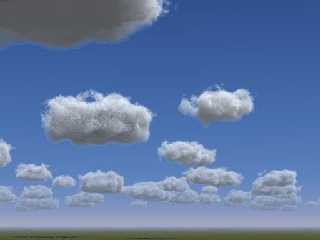|
 |
Nice work Bill. It reminds me of my own attempts at clouds (see
attached picture). I used the f_torus_gumdrop function to get the flat
base. I moved the bounding box so the torus and opposite gumdrop were
cropped out though
(http://www.econym.demon.co.uk/isotut/builtin3.htm#tg). I believe I
used bozo on top as well with just some turbulence, its been awhile.
Your attempts are significantly better though thanks to the speed
increases. I rendered it as an isosurface with a scattering media
density and I believe it took several hours on my 450 MHz. I was also
running into the transparency issues with overlapping media containers.
Anyway, the shape works fairly well for cumulus mediocris and cumulus
humilis. The bozo pattern doesn't really hold up on the taller forms of
cumulus and cumulonimbus. You need to be able to model a cauliflower
type shape and I'm still scratching my head on that one. I thought
about starting with a base shape like the gumdrop or hemisphere and
tracing spheres of decreasing of radius on top of it, but haven't gotten
around to actually playing with it.
Skip
Bill Pragnell wrote:
> Recently I've been playing with Gilles Tran's cloud generation technique (to
> whit: creating .dxf files from slices of monochrome pigments using an
> animation loop, and then using the .dxf file to define a media density -
> see http://www.oyonale.com/ressources/english/sources13.htm). I decided not
> to use his actual MakeCloud macro; I thought I'd do it from scratch to learn
> the ropes properly.
>
> This image is my most recent effort. Getting the media settings right didn't
> take too long, but I did have some difficulty balancing the solidity of the
> cloud with its opacity. This sounds like the same thing, but I found that
> the only way to make a cloud really opaque was to up the absorption. This
> made the shadowed areas really dark (more like heavy smoke), when in
> reality clouds tend to exhibit a kind of translucency. Adding a small
> amount of emission cured this problem nicely.
>
> More difficult is the shape. I think I've nailed the flat undersides that
> typify low-level heavy clouds, but getting the rest of it to look suitably
> 'billowy' at the same time is quite tricky. I've settled on using an
> isosurface to define the pigment (I find the shapes are easier to control);
> this cloud is a small-scale granite added to a larger-scale bozo added to
> tall hemisphere on top of an inverted flattened hemisphere (the latter
> provides the flat underside).
>
> Comments / suggestions for other refining the shape, anyone?
>
> Bill
>
>
> ------------------------------------------------------------------------
>
Post a reply to this message
Attachments:
Download 'cloud test 16.jpg' (20 KB)
Preview of image 'cloud test 16.jpg'

|
 |




![]()